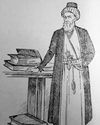Prøve GULL - Gratis
Moral Decision-Making for a Job Search
Philosophy Now
|October/November 2025
Norman Schultz wonders when working is wrong.
-

Back in 2018 I found myself in an interesting spot. I had decided to leave academia and education to pursue something new in my working life. Despite the downsides, it's easy to feel morally comfortable with being a teacher, but many other jobs can give pause. The timing and my background placed me in a near perfect position to think about how ethics factors into choosing a career. So on what criteria does one base the moral legitimacy of a job? I realized that:
1. Many people take jobs they aren’t morally comfortable doing.
2. There probably are some truly immoral jobs — by which I mean, perfectly legal jobs no one should take.
3. People use a common set of reasons to justify morally questionable employment.
I suspect most people don’t look at the job market this way, probably due to personal preference — “I don’t judge others, but I wouldn’t feel right doing that for a living.” But in the interconnected world, one’s work can affect an enormous number of people. So if a job is immoral, performing that job could do quite a lot of harm. I want us to explore these matters here.
What Do I Mean by ‘Job’?
One might think that the subject simply reduces to a more general consideration of moral theory, in that I’m really asking on what criteria we correctly judge right and wrong at all. But there are relevant particulars to employment that weigh in on making a moral evaluation there. The fact that most people must work and each worker is often just one player in a large industry complicates matters. But first and foremost, I must clarify what counts as ‘employment’.
Denne historien er fra October/November 2025-utgaven av Philosophy Now.
Abonner på Magzter GOLD for å få tilgang til tusenvis av kuraterte premiumhistorier og over 9000 magasiner og aviser.
Allerede abonnent? Logg på
FLERE HISTORIER FRA Philosophy Now

Philosophy Now
Bilbo Theorizes About Wellbeing
Eric Comerford overhears Bilbo and Gandalf discussing happiness.
9 mins
December 2025 / January 2026

Philosophy Now
What Women?
Marcia Yudkin remembers almost choking at Cornell
11 mins
December 2025 / January 2026

Philosophy Now
Islamic Philosophers On Tyranny
Amir Ali Maleki looks at tyranny from an Islamic perspective.
4 mins
December 2025 / January 2026

Philosophy Now
Peter Singer
The controversial Australian philosopher defends the right to choose to die on utilitarian grounds
5 mins
December 2025 / January 2026

Philosophy Now
Another Conversation with Martin Heidegger?
Raymond Tallis talks about communication problems.
7 mins
December 2025 / January 2026

Philosophy Now
Letters
When inspiration strikes, don't bottle it up. Email me at rick.lewis@philosophynow.org Keep them short and keep them coming!
17 mins
December 2025 / January 2026

Philosophy Now
The Philosophy of William Blake
Mark Vernon looks at the imaginative thinking of an imaginative artist.
9 mins
December 2025 / January 2026

Philosophy Now
Philosophical Haiku
Peering through life’s lens God in nature is deduced: The joy of being.
1 mins
December 2025 / January 2026

Philosophy Now
Philosophy Shorts
More songs about Buildings and Food' was the title of a 1978 album by the rock band Talking Heads. It was about all the things rock stars normally don't sing about. Pop songs are usually about variations on the theme of love; tracks like Rose Royce's 1976 hit 'Car Wash' are the exception. Philosophers, likewise, tend to have a narrow focus on epistemology, metaphysics and trifles like the meaning of life. But occasionally great minds stray from their turf and write about other matters, for example buildings (Martin Heidegger), food (Hobbes), tomato juice (Robert Nozick), and the weather (Lucretius and Aristotle). This series of Shorts is about these unfamiliar themes; about the things philosophers also write about.
2 mins
December 2025 / January 2026

Philosophy Now
Hedonic Treadmills in the Vale of Tears
Michael Gracey looks at how philosophers have pursued happiness.
8 mins
December 2025 / January 2026
Listen
Translate
Change font size
